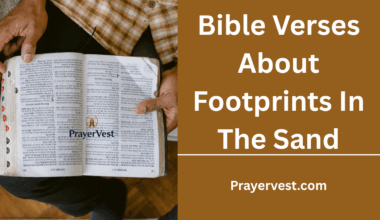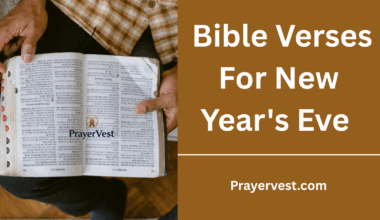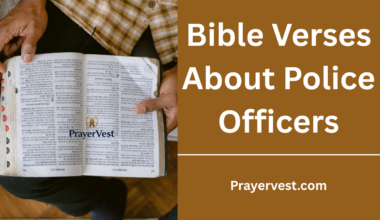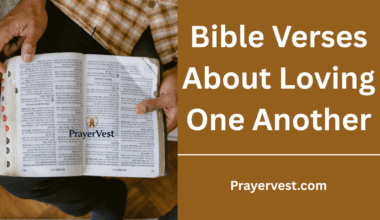One of the main themes that runs through the Bible is community, which reflects God’s will for people to live in community rather than seclusion. The Bible highlights the value of harmony, caring for one another, and having a common religion from the very beginning, when God said that it was not good for man to be alone, to the founding of the early church.
Love, service, and accountability are the foundations of a true biblical community, where members support one another in their spiritual journey and support one another through both setbacks and victories.
The Bible’s call to community is both relevant and revolutionary in today’s society, where individualism frequently triumphs over shared responsibility.
The Bible serves as a reminder that we are all members of one body and are obligated to support one another in our faith, share in one another’s joys, and bear one another’s burdens. Community is more than just friendship; it’s about sharing the gospel, exhibiting Christ’s love, and being the world’s living examples of God’s kindness.
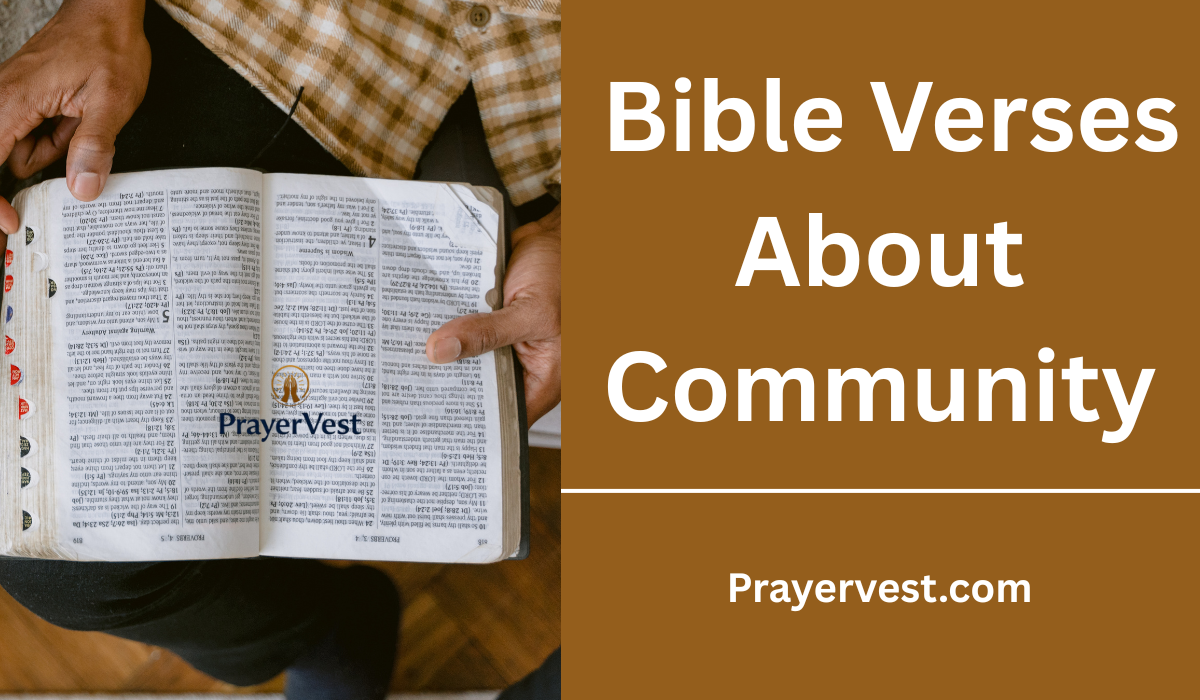

These community-related Bible verses offer insight and direction for developing bonds that are true to God’s will. They serve as a reminder that the church is a family of believers bound together by Christ, not just a structure. By accepting these teachings, we discover how to deepen our relationships with others, cultivate sincere camaraderie, and encounter the fullness of God’s presence via love, service, and worship. In the end, community is a gift from God that enables us to live out our faith in solidarity and strength, develop spiritually, and maintain accountability.
40 Inspiring Bible Verses About Community (2026)
1. Genesis 2:18
“The Lord God said, ‘It is not good for the man to be alone. I will make a helper suitable for him.’”
This foundational verse shows God’s design for human connection. From the very beginning, God recognized the need for companionship and created community as part of His plan. True community begins with God’s acknowledgment that life is not meant to be lived in isolation.
2. Exodus 18:21
“But select capable men from all the people—men who fear God, trustworthy men who hate dishonest gain—and appoint them as officials over thousands, hundreds, fifties and tens.”
Here, Moses receives wise counsel from Jethro about sharing leadership. This verse emphasizes the importance of structure and responsibility within a community. Strong communities thrive when leadership is shared, trusted, and rooted in integrity.
3. Leviticus 19:18
“Do not seek revenge or bear a grudge against anyone among your people, but love your neighbor as yourself. I am the Lord.”
God establishes love as the guiding principle for community living. This verse calls us to forgiveness, reconciliation, and a selfless attitude toward others, which are vital for building strong and lasting bonds.
4. Psalm 133:1
“How good and pleasant it is when God’s people live together in unity!”
The psalmist celebrates the beauty of unity in community. When people dwell together in harmony, it not only brings joy but also reflects God’s heart and establishes an environment where His blessings can flow freely.
5. Ecclesiastes 4:9-10
“Two are better than one, because they have a good return for their labor: If either of them falls down, one can help the other up. But pity anyone who falls and has no one to help them up.”
This wisdom passage highlights the strength of partnership and support in the community. Life’s burdens are lighter when shared, and mutual encouragement makes the journey more meaningful and bearable.
6. Proverbs 27:17
“As iron sharpens iron, so one person sharpens another.”
This proverb beautifully illustrates the power of relationships in shaping character and wisdom. Just as iron must come into contact with iron to be sharpened, people grow and develop best in the context of community. Healthy friendships challenge us to become better, refine our thinking, and encourage us to walk more faithfully with God. Community is not just about fellowship; it is also about accountability, growth, and the mutual strengthening that happens when believers walk together in truth.
7. Isaiah 41:6
“They help each other and say to their companions, ‘Be strong!’”
This verse reveals the essence of encouragement within community. When difficulties arise, God’s people are not meant to face them alone. Instead, they are called to lift one another up with words of strength and courage. The power of community lies in its ability to remind us of God’s promises when we are weary. Supportive words and gestures from others often become the very tools God uses to sustain us in times of weakness. Community thrives where encouragement flows freely.
8. Jeremiah 29:7
“Also, seek the peace and prosperity of the city to which I have carried you into exile. Pray to the Lord for it, because if it prospers, you too will prosper.”
Even in exile, God called His people to be a blessing to the wider community around them. This verse teaches that community is not limited to those who believe as we do but extends to the cities and societies in which we live. When believers pray for and contribute to the well-being of their communities, everyone benefits. It’s a reminder that Christians are called to be salt and light wherever they are placed, working for the common good.
9. Matthew 18:20
“For where two or three gather in my name, there am I with them.”
Jesus emphasizes the sacredness of small gatherings in His name. Community is not defined by numbers but by presence—the presence of Christ Himself. This verse assures us that whenever believers unite in prayer, worship, or fellowship, Jesus is among them. True Christian community is centered around Christ, and His presence transforms ordinary gatherings into holy encounters where lives are strengthened and faith is deepened.
10. Acts 2:44-45
“All the believers were together and had everything in common. They sold property and possessions to give to anyone who had need.”
The early church modeled radical generosity and unity. These verses describe a community where believers held nothing back but shared freely to ensure that no one lacked. Such a community was marked by sacrificial love, practical support, and deep commitment to one another’s well-being. This passage challenges modern believers to move beyond individualism and embrace a way of life where the needs of others are seen as our responsibility too. A Christ-centered community embodies generosity as an act of love and obedience.
11. Romans 12:4-5
“For just as each of us has one body with many members, and these members do not all have the same function, so in Christ we, though many, form one body, and each member belongs to all the others.”
Paul uses the imagery of the human body to describe the interdependence of believers in community. Each member has a distinct role, but all are connected and essential. This verse teaches us that true community recognizes diversity as strength rather than division. We flourish when we honor one another’s gifts and live with the awareness that we are deeply connected, belonging not only to God but also to each other.
12. Romans 15:5-6
“May the God who gives endurance and encouragement give you the same attitude of mind toward each other that Christ Jesus had, so that with one mind and one voice you may glorify the God and Father of our Lord Jesus Christ.”
This prayer highlights the unity of spirit as the goal of the Christian community. When believers adopt Christ’s attitude of humility and love, they can live in harmony, glorifying God together. Community is not just about coexisting—it is about moving forward with a shared heart and purpose, reflecting heaven’s unity here on earth.
13. 1 Corinthians 1:10
“I appeal to you, brothers and sisters, in the name of our Lord Jesus Christ, that all of you agree with one another in what you say and that there be no divisions among you, but that you be perfectly united in mind and thought.”
Paul urges the Corinthian church to abandon divisions and pursue unity. Community suffers when factions and disagreements take root, but it thrives when believers commit to reconciliation and mutual understanding. This verse challenges us to set aside pride and personal agendas, focusing instead on Christ who unites us all.
14. 1 Corinthians 12:25-26
“So that there should be no division in the body, but that its parts should have equal concern for each other. If one part suffers, every part suffers with it; if one part is honored, every part rejoices with it.”
Here, Paul emphasizes compassion and shared experience within the community. True Christian fellowship means that no one suffers alone, and no one celebrates in isolation. By carrying each other’s burdens and rejoicing together, the community becomes a tangible expression of Christ’s love.
15. Galatians 6:2
“Carry each other’s burdens, and in this way you will fulfill the law of Christ.”
This verse calls us to practical compassion. Community is not simply about gathering but about actively sharing life’s struggles. By helping one another through difficulties—whether physical, emotional, or spiritual—we demonstrate the love of Christ. Bearing burdens together transforms a group of individuals into a true family of faith.
16. Ephesians 4:2-3
“Be completely humble and gentle; be patient, bearing with one another in love. Make every effort to keep the unity of the Spirit through the bond of peace.”
Paul outlines the character traits essential for preserving unity in community. Humility, gentleness, patience, and love are not optional—they are the foundation of peaceful fellowship. Community requires intentional effort, and when believers embody these virtues, unity becomes not just possible but inevitable.
17. Ephesians 4:16
“From him the whole body, joined and held together by every supporting ligament, grows and builds itself up in love, as each part does its work.”
This verse emphasizes growth through connection. The body of Christ grows stronger when every member contributes faithfully. A thriving community is one where each person recognizes their role and invests in the collective good, building one another up in love.
18. Philippians 2:3-4
“Do nothing out of selfish ambition or vain conceit. Rather, in humility value others above yourselves, not looking to your own interests but each of you to the interests of the others.”
Paul redefines greatness in community as selflessness and humility. When believers prioritize the needs of others, communities flourish in love and harmony. This verse challenges us to shift from individualism to a Christlike mindset that seeks the well-being of others first.
19. Colossians 3:13-14
“Bear with each other and forgive one another if any of you has a grievance against someone. Forgive as the Lord forgave you. And over all these virtues put on love, which binds them all together in perfect unity.”
Forgiveness is the glue that holds a community together. Conflicts are inevitable, but without forgiveness, bitterness can destroy fellowship. Paul calls believers to mirror Christ’s forgiveness, wrapping all virtues in love. This creates a community bound by grace and unity.
20. 1 Thessalonians 5:11
“Therefore encourage one another and build each other up, just as in fact you are doing.”
Paul commends and exhorts the church to continue in encouragement. Communities grow stronger when members actively uplift each other through words and actions. Encouragement is a vital expression of love—it breathes life into weary hearts and empowers believers to persevere in faith.
21. Hebrews 10:24-25
“And let us consider how we may spur one another on toward love and good deeds, not giving up meeting together, as some are in the habit of doing, but encouraging one another—and all the more as you see the Day approaching.”
These verses emphasize the importance of gathering as a community of believers. Meeting together is not merely a tradition but a divine design to stir up love, inspire good works, and encourage perseverance. Community gatherings are a vital lifeline where faith is strengthened and hope is renewed.
22. James 5:16
“Therefore confess your sins to each other and pray for each other so that you may be healed. The prayer of a righteous person is powerful and effective.”
James highlights vulnerability and prayer as pillars of community. True fellowship involves honesty, accountability, and intercession. When believers share their struggles and lift one another up in prayer, healing—both spiritual and emotional—flows. Community becomes a sanctuary of grace and restoration.
23. 1 Peter 3:8
“Finally, all of you, be like-minded, be sympathetic, love one another, be compassionate and humble.”
Peter gives a clear vision of the attitudes that shape strong community life: unity, empathy, love, compassion, and humility. These are not just abstract virtues but daily practices that bind a community together, making it a reflection of Christ’s heart in action.
24. 1 Peter 4:9-10
“Offer hospitality to one another without grumbling. Each of you should use whatever gift you have received to serve others, as faithful stewards of God’s grace in its various forms.”
Hospitality is a cornerstone of the Christian community. Opening our homes, hearts, and lives to others creates a welcoming environment where grace is shared freely. Every believer has gifts meant to bless the community, and stewardship of those gifts builds up the body of Christ in love.
25. 1 John 1:7
“But if we walk in the light, as he is in the light, we have fellowship with one another, and the blood of Jesus, his Son, purifies us from all sin.”
John connects walking in God’s light with fellowship among believers. Community thrives in honesty and truth, not in secrecy or sin. The cleansing power of Christ makes fellowship possible, breaking down barriers and uniting believers in purity and grace.
26. 1 John 3:16
“This is how we know what love is: Jesus Christ laid down his life for us. And we ought to lay down our lives for our brothers and sisters.”
The ultimate example of community love is found in Christ’s sacrifice. This verse challenges believers to embody selfless love by putting others’ needs above their own—even to the point of sacrifice. True community demands a willingness to love as Christ loved, unconditionally and sacrificially.
27. 1 John 4:11-12
“Dear friends, since God so loved us, we also ought to love one another. No one has ever seen God; but if we love one another, God lives in us and his love is made complete in us.”
John explains that love within the community is evidence of God’s presence. Though God is unseen, His reality is manifested when believers love one another. Community becomes a living testimony of divine love, making God visible through acts of kindness and unity.
28. Ecclesiastes 4:12
“Though one may be overpowered, two can defend themselves. A cord of three strands is not quickly broken.”
This verse celebrates the strength of companionship. Alone we are vulnerable, but together we are resilient. A threefold cord—symbolizing unity with God at the center—illustrates how strong and unbreakable a community can be when bound by divine love and mutual support.
29. Zechariah 7:9-10
“This is what the Lord Almighty said: ‘Administer true justice; show mercy and compassion to one another. Do not oppress the widow or the fatherless, the foreigner or the poor. Do not plot evil against each other.’”
God’s vision for community includes justice and compassion. A true godly community cares for the vulnerable and protects the oppressed. By practicing mercy and fairness, believers reflect the character of God and build communities rooted in righteousness and love.
30. Matthew 22:37-39
“Jesus replied: ‘Love the Lord your God with all your heart and with all your soul and with all your mind.’ This is the first and greatest commandment. And the second is like it: ‘Love your neighbor as yourself.’”
Jesus summarizes the essence of community living with two commandments: love for God and love for others. This verse forms the foundation of Christian community, showing that fellowship flows out of wholehearted devotion to God and genuine love for people.
31. Luke 6:31
“Do to others as you would have them do to you.”
Known as the Golden Rule, this verse is foundational for building healthy community. It calls for empathy, fairness, and kindness in every interaction. Communities thrive when members treat one another with the same respect and dignity they themselves desire, creating an atmosphere of mutual love and trust.
32. Luke 10:27
“He answered, ‘Love the Lord your God with all your heart and with all your soul and with all your strength and with all your mind’; and, ‘Love your neighbor as yourself.’”
Jesus affirms that love is the heartbeat of true community. This dual commandment links love for God with love for others, showing that one cannot exist without the other. Communities rooted in love become spaces where God’s presence is evident and His purposes are fulfilled.
33. John 13:34-35
“A new command I give you: Love one another. As I have loved you, so you must love one another. By this everyone will know that you are my disciples, if you love one another.”
Jesus sets love as the distinguishing mark of His followers. Community is not recognized by buildings, programs, or rituals, but by genuine love that mirrors Christ’s sacrificial love. When believers love each other deeply, the world sees a living testimony of the Gospel.
34. John 15:12-13
“My command is this: Love each other as I have loved you. Greater love has no one than this: to lay down one’s life for one’s friends.”
Here, Jesus defines the highest form of love—sacrifice for others. True community is marked by this kind of love, where self-interest gives way to service and care for others. It is a radical call to prioritize the needs of our brothers and sisters, even at personal cost.
35. Acts 4:32
“All the believers were one in heart and mind. No one claimed that any of their possessions was their own, but they shared everything they had.”
This verse offers a glimpse of the early church’s extraordinary unity. Their community was not only spiritual but practical, marked by generosity and shared resources. Such selfless unity demonstrates the transforming power of the Holy Spirit in bringing people together.
36. Romans 14:19
“Let us therefore make every effort to do what leads to peace and to mutual edification.”
Paul exhorts believers to actively pursue peace and build each other up. Community requires effort and intentionality, especially when differences arise. By choosing peace over conflict and encouragement over criticism, believers create a nurturing environment where all can grow.
37. Galatians 3:28
“There is neither Jew nor Gentile, neither slave nor free, nor is there male and female, for you are all one in Christ Jesus.”
This verse declares the radical equality of all believers in Christ. Community transcends cultural, social, and gender divisions. In God’s family, every person is valued, honored, and unified by the same Spirit. Such unity is a powerful witness in a divided world.
38. Philippians 1:27
“Whatever happens, conduct yourselves in a manner worthy of the gospel of Christ. Then, whether I come and see you or only hear about you in my absence, I will know that you stand firm in the one Spirit, striving together as one for the faith of the gospel.”
Paul envisions community as a team united in purpose. Believers are called to live in a way that honors Christ, striving together in unity for the advancement of the Gospel. Community is strongest when believers stand side by side in faith and mission.
39. Hebrews 13:16
“And do not forget to do good and to share with others, for with such sacrifices God is pleased.”
This verse reminds believers that generosity and acts of kindness are essential in community life. Doing good and sharing with others are not optional but are sacrifices of worship that delight God. Community becomes a living sacrifice when members consistently look out for each other’s needs.
40. 1 Peter 2:9-10
“But you are a chosen people, a royal priesthood, a holy nation, God’s special possession, that you may declare the praises of him who called you out of darkness into his wonderful light. Once you were not a people, but now you are the people of God; once you had not received mercy, but now you have received mercy.”
Peter concludes with a powerful declaration of identity. The church is not just a collection of individuals but a chosen community belonging to God. This new identity transforms believers into a people of purpose, united by grace and called to proclaim God’s glory together.
Conclusion
To sum up, the Bible makes it very evident that community is crucial to leading a life that is centered on Christ and is not an option for believers. God made us to flourish in partnerships when love, responsibility, and support are freely given. Through community, we worship together, pray for one another, and help one another through life’s obstacles, giving us a tangible sense of God’s presence. The Bible serves as a reminder that we are stronger when we stand together and that friendship with others strengthens our faith.
In the end, community is a reflection of God’s fundamental nature, which calls His people to love and unity. We can develop relationships that glorify God, uphold the church, and bear testimony to the world of Christ’s transformative love by incorporating these Bible verses into our everyday lives. We become tools of support, healing, and hope for others when we live in genuine fellowship, in addition to receiving blessings for ourselves. We are called to live as one body in Christ, bound together by faith and purpose, and community is both a blessing and a duty.

